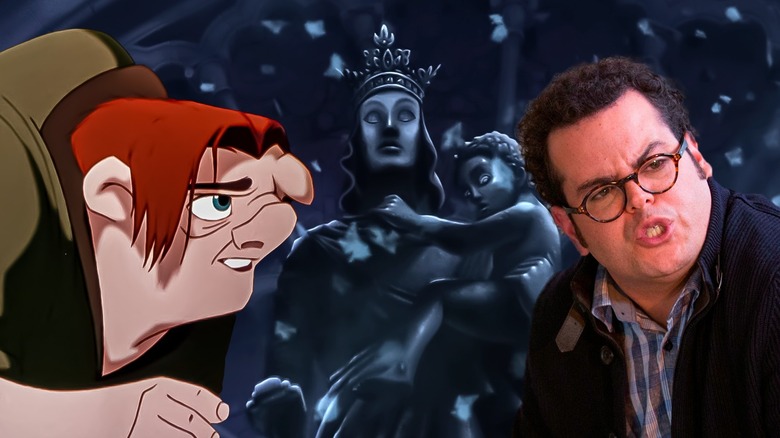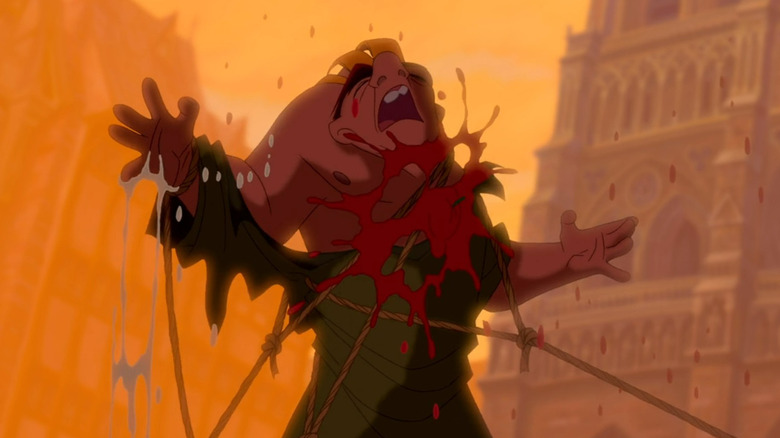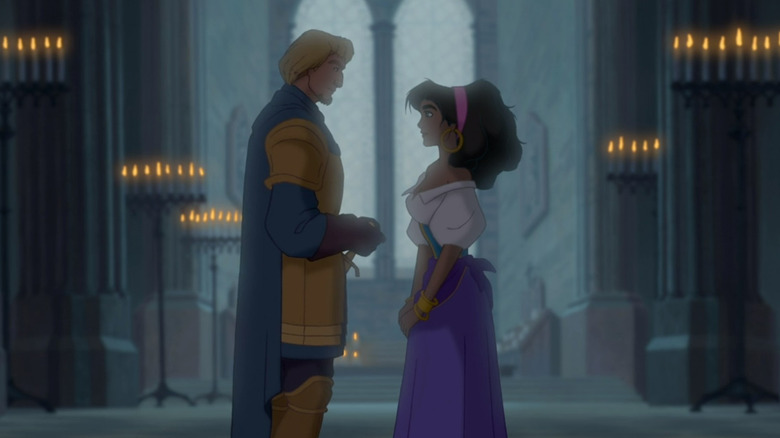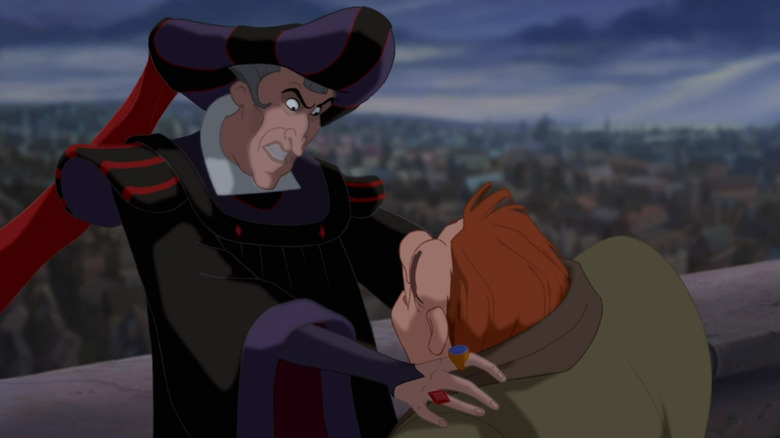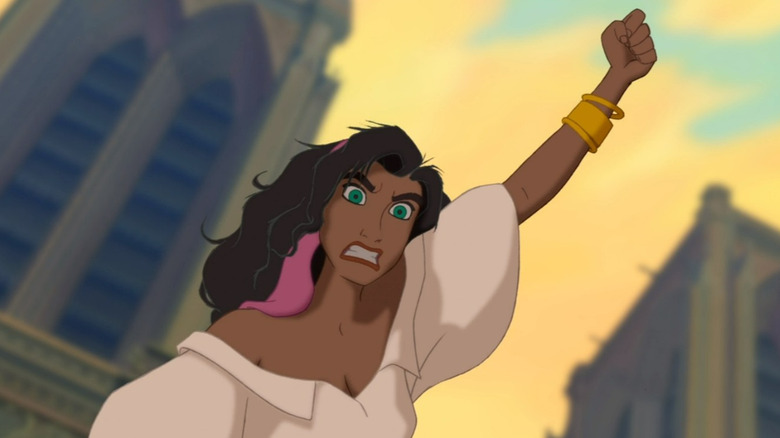Disney's Live-Action Hunchback Of Notre Dame Could Succeed But Only If It Sticks To Darker Themes
The Disney Live-Action Renaissance is struggling. Maybe not for dollars — nostalgia is as potent a drug as any — but for narrative value. These remakes attempt to recapture the magic of their animated counterparts while also attempting to solve their perceived shortcomings. While not an outlandish goal, Disney's adjustments to its tales as old as time seem designed with the intent of recontextualizing morality for a socially conscious audience. The results are ... iffy, at best. It's a recipe for disaster, a four-course meal of no siree, and now you're haunted by the possibility of a live-action remake of "Chicken Little." Instead, be haunted by a live-action remake of "The Hunchback of Notre Dame," because that one's actually in the works.
Back in 2019, it was reported that the House of Mouse was developing a live-action adaptation of its animated adaptation of Victor Hugo's French novel, with Josh Gad potentially attached to star as Quasimodo. Since then, the only substantial update came when Gad posted on Instagram to debunk a bit of viral fan-casting. The actor said, "The [Hunchback] script is one of the best I have read and hopefully the powers that be will see this love and let us make the live-action adaptation the original animated film deserves." All this to say, a live-action "Hunchback" has been written. And that's cause for concern. Because is Disney really ready to tackle its most somber story again?
Hunchback of Notre Dame is a story steeped in the sins of man
"The Hunchback of Notre Dame" is dark — darker by far than the rest of the Disney Renaissance films combined. The story features very real demons in a very real place. A minority group is viciously targeted by the church and the government for their lack of Catholic faith. A child with special needs is hidden away so that he might not cause dishonor for his insensitive caretaker. When that child grows up, he's brutally assaulted by the public for his unique appearance. A religious authority figure succumbs to lust and literally burns an entire city to soothe his shame. All this tragedy is framed by a simple, pointed question in the opening number ("The Bells of Notre Dame"): who is the monster and who is the man?
Can Disney honor the implications of this question in a live-action remake? Is a studio that still hides most of its LGBTQIA+ characters in the background really equipped to address the lethal dangers of organized religion? Because "Hunchback" can't hold back if it's going to be remotely worth watching. The antagonist, Claude Frollo (Tony Jay), is manipulative liar, a child abuser, an attempted rapist, and a literal murderer. Each of these abominable acts are specifically viewed through the lens of his religious zealotry. Listen, even the animated film, which replaced Frollo's title of archdeacon with the less Catholically-incriminating title of "judge," kept his core of religious obsession.
Which leads to an uncomfortable truth that must be voiced ...
The animated Hunchback of Notre Dame film struggled with the source material, too
"The Hunchback of Notre Dame" is a beautiful film with beautiful music and beautiful animation, but it still fails to respect key parts of Victor Hugo's original tale. At least, his descendants sure think so. Yes, Judge Claude Frollo is supposed to be archdeacon Claude Frollo, but there are other notable concessions made in the animated film, too. Onscreen, Esmeralda (Demi Moore) gets a happily ever after with Captain Phoebus (Kevin Kline), Frollo falls to his death after a gargoyle statue bursts to life, and Quasimodo (Tom Hulce) is finally free to roam Paris without fear of molestation. In Hugo's book, however, Esmeralda dies ... hung for crimes she did not commit. What's worse is that Phoebus could save her, but instead stays silent to protect his own reputation. Book-Quasimodo personally throws Frollo off the cathedral roof and then disappears into catacombs beneath the city to die a lonely death.
Change is inevitable when adapting media. It's not even wholly unwelcome, provided the core story and the spirit are left unaltered. The Disney Renaissance permitted most (not all, but most) of "Hunchback" to exist in animated form. Yes, gargoyles could sing and Phoebus wasn't a d-bag, but even so. By comparison, it seems unlikely for the Disney Live-Action Renaissance to permit this story to darken an otherwise politically neutral string of adaptations. That said, should Disney dare to do "Hunchback" justice, the studio could earn some serious social clout.
Hunchback of Notre Dame already fits the Live-Action Renaissance's meta-narrative
"The Hunchback of Notre Dame" is a cautionary tale about the consequences of bad people with authority believing they are good. A lack of media literacy might cause such a story to be misconstrued as one that delights in misery but that's simply not the case. If adapted in earnest, the core of "Hunchback" is just as relevant today as it's always been — no major tweaks necessary. Religion is still a favorite disguise of the cruel — social power, still a favorite tool. And it's not exactly a stretch to see why the oppression of the Romani people might translate to a more modern context, either. "Hunchback" is already progressive, folks.
And isn't that what the Disney Live-Action Renaissance wants to be, deep down? The 2015 version of "Cinderella" offered the titular princess (Lily James) a sharper mind. It was her determination to "have courage and be kind" that won over the prince (Richard Madden). The 2017 version of "Beauty and the Beast" offered Belle (Emma Watson) ample opportunities to correct the Beast (Dan Stevens) on his egregious behavior towards, well, everyone. The 2019 version of "Aladdin" offered Jasmine (Naomi Scott) more agency, as well, by transforming her into an advocate for women's rights in a room full of misogynists.
Where "Hunchback" differs from these is that, unlike the other stories mentioned, it never really existed in a way that ignored society. The original text is painfully aware of the world in which it lives.
A faithful Hunchback of Notre Dame adaptation isn't just possible, it's been done before
Although Disney's track record of ignoring Broadway when the live-action remakes roll around indicates otherwise, the stage musical of "The Hunchback of Notre Dame" could provide a guiding light. The musical blends a more faithful adaptation of the book with the music of the animated Disney film. Onstage, Frollo gets a back story that explains his demented position without justifying it, Esmeralda gets to teach Phoebus how to be a better activist, and Quasimodo gets to deal with Frollo like the human-shaped trash he is. Yes, Esmeralda and Quasimodo still die — these are the real consequences to real actions.
But the musical offers hope, and through that hope, Disney could find their seed of progressive change, should one still be desired. In the finale, Phoebus leads a revolution against the church to rescue Esmeralda. Tragically, he's too late to save her but the people of Paris still make stand for a better future. That's not nothing.
"Hunchback" is a veritable powder keg of social issues and the whole point is that it explodes. It's inherently divisive. But it's powerful, too. And it deserves the justice Esmeralda so desperately sought. If Disney provides that in a live-action remake, well, it won't erase the mistakes that came before ... but it will go a long way toward earning the respect a studio as monopolistic as the House of Mouse should strive for. Otherwise, it won't be Phoebus leading a revolution. It will be the fans.
